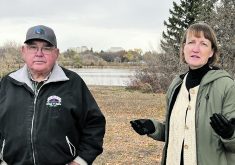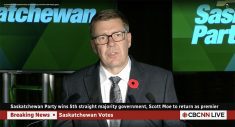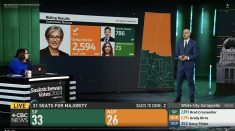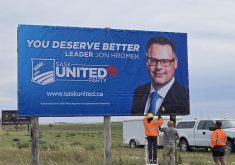Saskatchewan Association of Rural Municipalities says rural voters are also focused on road infrastructure and carbon tax
Improved broadband service tops the list for many rural voters as they assess party promises during the Saskatchewan election campaign.
Saskatchewan Association of Rural Municipalities president Ray Orb said rural residents have long been promised better internet and cellular phone service by both federal and provincial governments.
“It’s very slow to come to fruition, that’s for sure,” he said.
COVID-19 has exacerbated the connectivity problem for those who tried to work and learn from home with spotty coverage. Orb said many are concerned about isolated seniors in rural areas who may struggle with communication anyway.
Read Also

Crop quality looks good this year across Prairies
Crop quality looks real good this year, with the exception of durum.
He said even RM councillors find that they have to travel into towns and villages for meetings because their connectivity is so poor that they can’t attend online.
“There doesn’t need to be more study or consultation,” Orb said. “We think it should be declared an essential service.”
Broadband is fundamental to the rural economy, which drives the province, he said.
In some other provinces, small companies have set up to provide rural service and Orb said they want to do business in Saskatchewan.
SARM has been working with SaskTel and the provincial government on ways to advance the service more quickly.
“We’re afraid we’re going to fall behind in this province,” he said.
Rural voters and farmers have identified more infrastructure spending on both provincial highways and municipal roads, more value-added agriculture, and the carbon tax as issues they want addressed.
The carbon tax remains a polarizing issue, as some say it’s here to stay so the province and farmers had better get used to it while others want to see the fight against it continued.
More broadly, SARM is advocating a carbon offset system so that farmers could sell their carbon credits but Orb said the outcome of Saskatchewan’s appeal to the Supreme Court on the constitutionality of the tax might affect the timing of that.
Orb also said that whoever forms government after Oct. 26 must continue funding for crime reduction initiatives that the previous government started.
Statistics show that crime in rural areas is dropping, yet the RCMP Crime Watch Advisory app notes daily occurrences.
Orb said rural voters should ask all their candidates about these issues and others of concern.
Meanwhile, both Saskatchewan Party leader Scott Moe and NDP leader Ryan Meili stuck largely to the cities during the campaign’s first week.
The NDP announced one specific rural pledge to spend $3 million for a rural education strategy that would address the “unique” needs of rural schools. It would also form a rural education task force to identify those needs.
The party has also promised funding for smaller classrooms, a $100-million investment in health care for more staff, a one-percent tax on people with net worth of more than $15 million, an inquiry into the Global Transportation Hub and Regina Bypass, pay equity legislation for women, and a ban on dress codes that make women less safe at work, including mandatory high heels.
The Sask. Party announced a 10.5-percent tax credit on up to $20,000 worth of eligible home renovations, a 10-percent rebate on power bills for a year — which could return $845 to the average farm customer, reducing the small business tax rate for three years, increasing the Saskatchewan Advantage Scholarship for students from $500 to $750 per year, and re-starting the Active Families Benefit of $150 per year per child for families with income under $60,000.


















